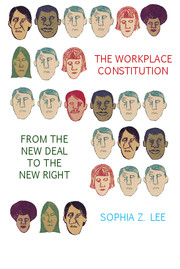Book contents
- Frontmatter
- Contents
- Acknowledgments
- Introduction
- Part I Crafting the Workplace Constitution in the New Deal 1930s and 1940s
- Part II Advancing the Workplace Constitution in the Cold War 1950s
- Part III Administering the Liberal Workplace Constitution in the Long 1960s
- 7 Agencies Recognize the Liberal Workplace Constitution in the New Frontier
- 8 The Liberal Workplace Constitution on the Air and over the Wires
- 9 The NLRB Expands the Liberal Workplace Constitution
- Part IV The Workplace Constitution in the New Right 1970s and 1980s
- Epilogue
- Appendix: Figures
- Notes
- Selected Bibliography of Primary Sources
- Index
7 - Agencies Recognize the Liberal Workplace Constitution in the New Frontier
Published online by Cambridge University Press: 05 October 2014
- Frontmatter
- Contents
- Acknowledgments
- Introduction
- Part I Crafting the Workplace Constitution in the New Deal 1930s and 1940s
- Part II Advancing the Workplace Constitution in the Cold War 1950s
- Part III Administering the Liberal Workplace Constitution in the Long 1960s
- 7 Agencies Recognize the Liberal Workplace Constitution in the New Frontier
- 8 The Liberal Workplace Constitution on the Air and over the Wires
- 9 The NLRB Expands the Liberal Workplace Constitution
- Part IV The Workplace Constitution in the New Right 1970s and 1980s
- Epilogue
- Appendix: Figures
- Notes
- Selected Bibliography of Primary Sources
- Index
Summary
“Stator v. Privatus”
Archibald CoxWriting one’s name can be the most mundane of acts, but for Ivory Davis, it was an act of resistance. It was 1962 and Davis was a leader in the all-black local of the Independent Metal Workers Union. For decades, Davis’s employer, the Hughes Tool Company in Houston, had confined African American workers to the least-skilled, lowest-paying jobs. In the latest round of contract negotiations, Davis’s local had refused to sign any contract “unless it provided equitable opportunity and job advancements for all employees.” The company and the whites-only local instead renewed the existing racially stratified contract and, salting the wound, created six new apprenticeship positions for the higher-paying and still all-white tool and die department. When the company asked for applicants in February 1962, Ivory Davis signed up. His local insisted that its members deserved “to be treated like all other Americans” and should be “eligible to fill the [apprenticeship] jobs.” The company did not award Davis an apprenticeship, however, citing the contract’s terms, and the white local refused to help Davis challenge (or “grieve”) the company’s decision. Davis and his local took their protest to the National Labor Relations Board instead.
By the time Davis’s local filed its unfair labor practice charges in 1962, African Americans’ freedom struggle was consuming the nation’s attention. The 1960 decision by four black college students to ask for service at a Woolworth’s lunch counter in Greensboro, North Carolina, had sparked a sit-in movement that rippled across the South and inspired mass actions on an unprecedented scale. Best known are the southern Freedom Rides, the rural Mississippi voter registration drives, and Martin Luther King Jr.’s marches down the streets of Birmingham, Alabama. Less well known are the protests by angry picketers in cities across the Rust Belt who demanded jobs for black construction workers, and the complaints black workers like Davis made to the NLRB in cities from San Francisco to the Southeast.
- Type
- Chapter
- Information
- The Workplace Constitution from the New Deal to the New Right , pp. 135 - 154Publisher: Cambridge University PressPrint publication year: 2014



